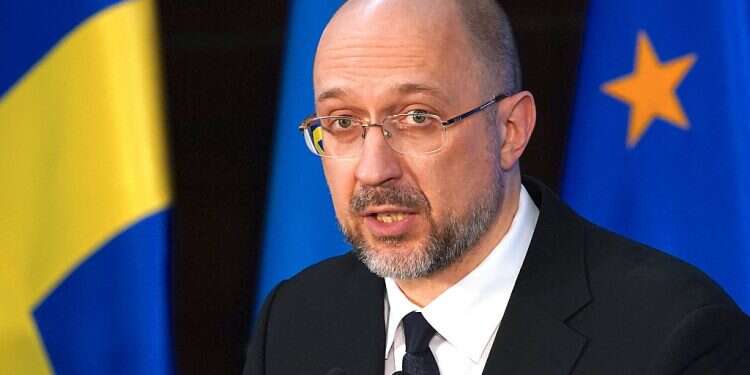Ukraine has asked Israel for a half a billion-dollar loan as its economy continues to be impacted by the war, Israel Hayom has learned. Jerusalem has confirmed the report and said it was examining the matter.
Follow Israel Hayom on Facebook, Twitter, and Instagram
The request was submitted by Ukraine's Prime Minister Denys Shmyhal. In a letter sent about two weeks ago, the official asked for a loan to help deal with the catastrophic impact of the war on the Ukrainian economy.
According to official statistics, Ukraine's GDP decreased by 15.1% in the first quarter of 2022 compared to the same period last year. According to the International Monetary Fund, the war-torn country's economy will shrink by a further 30-45% by the end of the year.
"Many countries in the world have already allocated loans for Ukraine," Shimon Briman, an expert on Israeli-Ukrainian ties, told Israel Hayom. "For example, Japan has allocated $600 million with a 30-year loan period, with a grace period of 10 years, and only 1% annual interest. Luxembourg has allocated a 250 million euro loan, Germany 300 million euros, and Canada 800 million dollars."
Briman explained, "If Israel approves Ukraine's loan request, the Jewish state will not only help 40 million people in their just struggle for survival but also show that it chose the right side in the fight against dictatorship and barbarism."
The Prime Minister's Office said in a statement that Ukraine's Ambassador to Israel Yevgen Korniychuk submitted the request on behalf of Shmyhal. The ambassador was informed that the request had been received and was being examined.
Meanwhile, Ukraine said on Tuesday its forces were still holding out inside Sievierodonetsk and trying to evacuate civilians after Russia destroyed the last bridge to the devastated eastern city in a potential turning point in one of the war's bloodiest battles.
Russia said it would give Ukrainian fighters holed up in a chemical plant inside the city a chance to surrender on Wednesday morning. Fighters should "stop their senseless resistance and lay down their arms" from 8 a.m. Moscow time, Interfax news agency quoted Mikhail Mizintsev, head of Russia's National Defence Management Centre, as saying.
The city's Ukrainian mayor, Oleksandr Stryuk, said: "The situation is very difficult but there is communication with the city" despite the last bridge over the Siverskyi Donets river having been destroyed. "Russian troops are trying to storm the city, but the military is holding firm."
Ukraine says more than 500 civilians are trapped inside Azot, a chemical factory where its forces have resisted weeks of Russian bombardment and assault.
Evacuations were still being carried out "every minute when there is a lull and there is a possibility of transportation," Stryuk said. "But these are discrete evacuations, done one by one, and every possible chance is taken."
Regional governor Serhiy Gaidai said: "The shelling is so powerful that people can no longer stand it in the shelters, their psychological state is on the edge. The last few days, the residents are finally ready to go."
Both sides claim to have inflicted huge casualties in the fighting over the city, Russia's main target in its battle for the east of the country after it failed to capture the capital Kyiv in March.
Ukraine still holds Lysychansk, Sievierodonetsk's twin city on higher ground on the opposite bank. But with all the bridges now cut, its forces acknowledge a threat that they could be encircled in Sievierodonetsk. Russia's separatist proxies said any Ukrainian troops left behind must surrender or die.
Damien Megrou, spokesperson for a unit of foreign volunteers helping to defend Sievierodonetsk, said there was a risk of leaving "a large pocket of Ukrainian defenders cut off from the rest of the Ukrainian troops" - as in Mariupol, the Black Sea port that surrendered last month after months of Russian siege.
Kyiv has said it is losing a staggering 100-200 soldiers killed each day, with hundreds more wounded. In an overnight address, President Volodymyr Zelenskyy described the battle for the eastern Donbas region - partly occupied by Moscow proxies since 2014 - as one of the most brutal in European history.
Russia gives no regular figures of its own losses but Western countries say they have been massive, as Moscow has committed the bulk of its firepower to delivering one of President Vladimir Putin's stated objectives: forcing Kyiv to cede the full territory of two eastern provinces.
Subscribe to Israel Hayom's daily newsletter and never miss our top stories!
Momentum in Sievierodonetsk has shifted several times over the past few weeks – with Russia concentrating its overwhelming artillery firepower on urban districts to obliterate resistance, then sending in footsoldiers vulnerable to counter-attacks.
Bigger battles could lie ahead for the wider Ukrainian-held pocket of the Donbas, nearly all on the opposite bank of the river that Russian forces have found difficult to cross. Ukraine says Russia is massing to assault Sloviansk from the north and along a front near Bakhmut to the south.
It has pleaded for the West to send more and better artillery.
"What we don't have enough of are the weapons that really hit the range that we need to reduce the advantage of the Russian Federation's equipment," Zelenskyy told Danish journalists at an online press briefing on Tuesday.
Ukraine needs 1,000 howitzers, 500 tanks, and 1,000 drones among other heavy weapons, Presidential Adviser Mykhailo Podolyak said on Monday. Western countries have promised NATO-standard weapons - including advanced US rockets. But deploying them is taking time.
Beyond the Donbas, Ukrainian officials hope that Russia's focus on capturing the east will drain its forces from other areas and pave the way for counter-attacks to recapture other territories.




